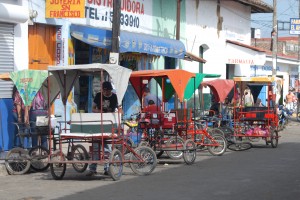An option that works
A few days ago, I found myself in the predawn gloom standing with my purple bag at a small bus company in La Ceiba. I was trying to get to a small town further along the Caribbean coast. My objective had been to take a 6am bus, but the taxi driver brought me to another bus company. There was a way to get to the town, by hopping on the 5:30am micro-bus that stood full and ready to depart, and then change in another town. I was trying to ask about other bus companies, or from where that mysterious 6am bus departed, but the taxi driver asked me kindly but in confusion, ‘why are you not taking the option of this bus?’
That’s when it became apparent to me: here, people look for a solution. If it works, they don’t look further. This is the reasoning behind jury-rigged computers, showerheads with electrical heat switches to be switched when the water is running, and even using old American schoolbuses with baggage racks and sometimes seats from another bus. It’s the reason behind messy-looking shops, houses painted with water-based paint which peels easily, and the huge variety of transport options from bicycles (which can be lifted onto the top of the old schoolbuses if needed) to four-wheel drive trucks to people packed into cattle cars.
In the Global North, we are accustomed to reviewing a wealth of options and looking for the solution which is the best fit to our own individual needs and wants. This is what happened in the bus station when surrounded by the circle of helpers I described in a previous post. Locals came up with a solution that would eventually get us to Copan, and yet my European companion grumpily wanted one that fits his wants a bit better (and, indeed, our final choice got us there quickly and without the bother of changing buses).
People here find a solution and accept it if it works. This may not be efficient – but is time money everywhere? People in the Global North keep searching and comparing, trying to find the best solution. I am not suggesting that inventions should never be improved: I was most struck by William Kamkwamba’s description of building his windmill and later tinkering with small aspects to improve the design (I picked up The Boy Who Harnessed the Wind in a book exchange in Ometepe Island in Nicaragua.)
It may seem intuitive to you, readers in the North, that it is a sign of poor development to not have the opportunity to choose between options. But I wonder if we haven’t become overly spoiled with comparing and reviewing. Much of marketing is based on the concept that consumers will compare among competing products : anyone who has bought a mobile phone plan probably knows that the apparent differences and sense of choice are generally false. The plans are basically the same, and the enticements to get the consumer to change companies are short-lived and sometimes come with a unadvertised stinger in the tail. This is capitalism and consumer economics. But what if we all simply choose the plan that fulfilled our needs, rather than searching for the very best fit? Would consumerism slow down in its destruction of the planet? Would Quaker simplicity be better fulfilled?
In considering the course of an individual’s life, Viktor Frankl’s fascinating book Man’s Search for Meaning postulates that meaning in action or creativity, or love, are the central drivers of human beings – and the lack thereof can lead to a sense of imbalance, futility, or even lack of drive to live (for example in the concentration camps of the second World War). This may be connected to one of the social elements that is a hallmark of development: education. The goal of a good education is two-fold. Primary education aims to train young people first in literacy, to permit functioning and continued understanding of information in this world around us. But we in the North often assume the second goal is also just as fundamental: to give the skills to a young person to permit him or her to follow his or her heart and become a doctor or lawyer, a tour guide or shop owner.
However, even this is a model which puts the career before other elements of life, like love, being at home in own’s own culture, and other sources of meaning. Perhaps we have too many choices. I know myself, that I sometimes think it would be better if I could only choose to live in one country, if my life were less free to make new choices. This is because I know the grass does always seem greener elsewhere, and having the freedom to wander across the fenceline is not the blessing that it may seem to be.



Leave a Reply